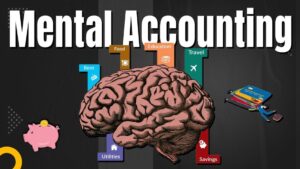When it comes to money, it’s not just about numbers; it’s also about feelings, habits, and psychology. Our behavior affects every financial decision we make, from short-term investments to everyday spending. Occasionally, our behavior makes sense, but usually we’re misled by our feelings and unconscious biases. Understanding how our behavior affects the choices we make around money can help us avoid mistakes that cost us money and develop better money habits. Our attitudes play a big role in how well we manage our money, whether we buy impulsively, invest out of fear, or are overconfident. In this article, we’ll discuss how behavior affects financial decisions and how you can make smarter, more careful choices.
Factors to Consider When Making Financial Decisions:
Financial decisions aren’t always based on thinking alone. Behavioral economics shows that people often rely on mental shortcuts, their feelings, and the opinions of others when managing money. For example, the “pain of paying” makes us think twice about using cash, but we still prefer a credit card. Fear of missing out (FOMO) can make us invest in risky investments, while loss aversion can make us hold onto stocks that lose value for a long time. The first step to gaining more control over your finances is to become aware of these psychological reasons. When we know why we do certain things with our money, we can change bad habits.
How Emotions Influence Our Consumption:
Often, we don’t even realize it, but our emotions determine how much we spend. Impulse purchases can happen when you’re stressed, pleased, or just plain bored. Shopping for fun may feel beneficial at the time, but in the long run, it can ruin your budget. On the other hand, fear of scarcity can make people overly frugal, preventing them from making wise investments in growth opportunities. To avoid overspending, think about whether you’re buying something because you need it or because you want it. By being more mindful about your spending, you can align your financial decisions with your long-term goals rather than your short-term emotions.
How Cognitive Biases Relate to Financial Management:
Cognitive biases are errors in our thinking that can cloud our judgment and lead us to make poor financial decisions. When we have confirmation bias, we seek information that supports what we already believe and ignore warning signs. When we anchor, we place too much value on the first piece of information we receive, such as the first stock price. We continue to invest large sums of money in the hope of recouping the money we lost to the sunk cost myth. Knowing these biases allows us to question our beliefs and make better financial choices. Slowing down and learning from other perspectives can lessen the impact.
Making Financial Decisions and Peer Pressure:
People don’t just make financial decisions for themselves; social norms and peer pressure also play a major role. Comparison makes you buy too many expensive things and find it hard to fit in. Social media worsens it by constantly showing other people’s highlights and making us feel like we’re behind financially. True financial freedom comes when you put your own goals above other people’s ideas. Avoid making poor financial choices because of peer pressure by setting boundaries, not comparing yourself to others, and focusing on your path.
How Personality Traits Affect the Way People Handle Money:
How we handle money depends on who we are. Risk takers may seek investments with high returns and ignore those that are stable. When risk is necessary, an overly cautious person won’t overlook growth opportunities. Procrastinators put off saving, while perfectionists worry about the little things and don’t take action. Knowing who you are when it comes to money can help you create a plan that works for you. For example, someone who likes to procrastinate might benefit from setting strict spending limits, while someone who prefers to take risks might benefit from automating their saving. When you fully understand yourself, your natural tendencies become advantages instead of problems.
The Impact of Instant Gratification on Long-Term Wealth:
In modern society, people like to get what they want as quickly as possible (buy now, pay later). However, this way of thinking can be detrimental to long-term wealth. Small impulse purchases can add up, but delaying saving can hinder growth. Financial success is all about the ability to wait until you get what you want. Studies like the popular “marshmallow test” have proven this. Training yourself to postpone current desires for the sake of future benefits develops self-discipline. The 24-hour rule (waiting a day before buying something unnecessary) or setting long-term goals can help you be more patient with your money.
Things That Get People into Debt:
People often feel guilty because of behavioral biases, such as optimism bias (“I’ll pay it back quickly”) or simply because they are used to borrowing money. Credit cards take advantage of such attitudes and make buying easy until the bill arrives. Lifestyle inflation, where spending exceeds income, can also lead to debt that can’t be resolved. To gain freedom, you need to plan honestly, figure out what you need and want, and pay off your high-interest debt first. By changing your behavior, such as spending only on unnecessary things or canceling your credit cards, you can borrow less.
How to Rewire Your Brain for Better Financial Habits:
To change the way you manage money, start with small, steady steps. Setting up automatic savings can help eliminate the urge to spend first. Setting clear, measurable goals (such as “save $500 a month”) can help people stick to them. Tracking your spending can help you stay accountable. And rewarding yourself at key moments can help reinforce positive habits. Mindfulness exercises, such as thinking about what you’re going to buy, can help you make less impulsive choices. Over time, these methods will change the way your brain works so that smart money flows make you happy. This process helps you maintain good habits.
Understanding Money Can Alter People’s Conduct:
Being educated about money can help you avoid making bad choices. Understanding the basics of budgeting, interest rates, and investing can give you more confidence and help you avoid making decisions based on fear. Understanding money can help you spot scams, avoid fraudulent loans, and make smart retirement plans. Continually learning new things, whether through a book, a class, or from a mentor, can help you align your behavior with your goals. Learning about the market can help you avoid letting your feelings and biases affect your money moves.
Conclusion:
You can achieve financial success even if you don’t make a lot of money or are unlucky. The way we earn, spend, save, and trade money is influenced by our feelings, biases, social norms, and personality traits. Understanding these behavioral factors can help us regain control over our financial lives. Small changes, like waiting before buying something or setting up automatic savings, can grow into lasting, beneficial habits. Self-awareness and purposeful decision-making are the first steps toward financial freedom. Remember that every dollar you spend is a step toward or away from your goals, so make smart choices.
FAQs:
1. Why do I buy things without thinking, even though I know it will affect my budget?
Emotions like anxiety or excitement can cause people to buy something unconsciously. To break this habit, you can set a time limit (e.g., 24 hours) for unnecessary sales.
2. How can I stop comparing my money to others?
Limit the time you spend on social media highlights, set your own financial goals, and remember that everyone’s journey is unique.
3. What’s the best way to overcome your fear of investing?
To slowly build confidence, it’s best to start with low-risk options. Learn as much as you can about them and consider talking to a financial advisor.
4. What prevents me from checking my bank account when I know it’s necessary?
This “ostrich effect” happens because people worry about their money. Checking your accounts once a week is a beneficial start.
5. Will my financial situation improve if I spend my money differently?
Absolutely! Small changes in habits, such as automatically saving money or being more mindful about your spending, can have a big effect in the long run.




